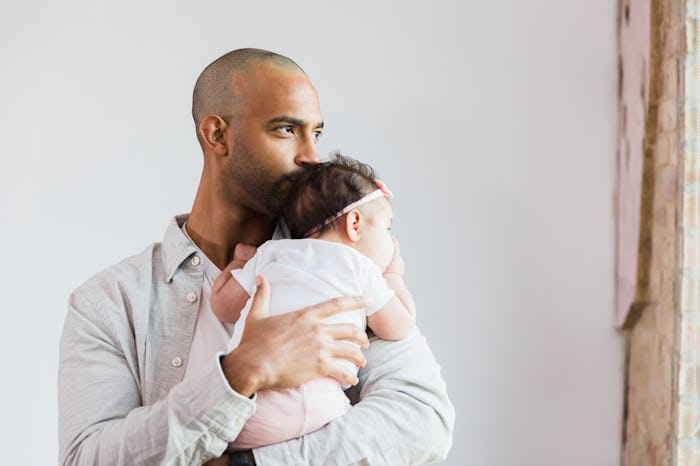Life

Study Suggests More Dads Should Be Screened For Postpartum Depression
A small study out of University of Illinois Chicago found nearly triple the rates of PPD than expected.
Whether or not you give birth, having a new baby in your life brings along an understandable whirlwind of emotions — some of it is good, some of it quite complicated. While postpartum depression (PPD) in new moms has been gaining recognition over the years, it’s only fairly recently we’ve considered that new fathers can have PPD. And it looks like we’ve been seriously underestimating just how common this is. Though sources like Postpartum Support International (PSI) say approximately 10% of dads deal with PPD, a new study from the University of Illinois Chicago suggest that number could be significantly higher.
The idea for the study came from conversations healthcare practitioners were having with fathers at the UI Health Two-Generation Clinic, which opened in 2020 to provide mothers with healthcare at the same time they brought their children in for their regular appointments. Dr. Sam Wainwright, the study’s lead author, told UIC Today that fathers who accompanied their families to their visits would open up about the fact that they were often putting on a brave face, saying things like “I’m really stressed, but I don’t want my partner to know because I’m here to support her.”
Published in the journal BMC Pregnancy and Childbirth, the study was small — only 24 new fathers completed the screening — but the results were staggering. Though the fathers self-reported low rates of stress and preexisting mental health conditions, 30% screened positive for PPD on Edinburgh Postnatal Depression Scale (EPDS), which was developed to help identify PPD among new moms. The study suggests that it was unlikely these signs of peripartum mental health challenges would have been identified without this study in place.
And yet, despite the fact that paternal PPD is a risk factor for worsened quality of life and poor physical and mental health, as well as developmental and relational harms in the father-mother-child triad, there are currently no PPD screening recommendations for fathers.
“A lot of dads are stressed,” Wainwight told UIC Today. “They’re scared. They’re struggling with balancing work and parental and partner responsibilities. Men are often not doing well, but no one is asking them about it.”
The study authors also believe that marginalizing men from perinatal care spaces, lack of paid parental leave for fathers, and social biases surrounding men taking time off to care for their children could also factor in to rates of (and risks for) paternal PPD.
There were other factors that the study believes could contribute to such high PPD indicators. The Two-Gen clinic serves socially vulnerable families, many of which endure poverty, housing instability, structural racism, violence, and lack of family and social support, all of which are known risk factors for postpartum depression. Moreover, the the number of mothers receiving care at the clinic who had screened positive for depression or anxiety at least once during their care was commensurate with rates of PPD observed in fathers (just under 32%), and the study notes that one caregiver having PPD can be a risk factor for the other.
While these findings are admittedly preliminary, they point to an area of healthcare that deserves far more study and resources. The study concludes, in part, “By welcoming fathers as an integral part of the health (and health care) of the family, our efforts acknowledge the ways in which expanding the focus of maternal-child health care teams can contribute to the improved functioning and optimal health of the entire family-unit.”